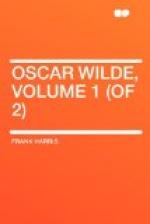QUEEN HENRIETTA MARIA
In the lone tent, waiting
for victory,
She stands with
eyes marred by the mists of pain,
Like some wan
lily overdrenched with rain:
The clamorous clang of arms,
the ensanguined sky,
War’s ruin, and the
wreck of chivalry,
To her proud soul
no common fear can bring:
Bravely she tarrieth
for her Lord the King,
Her soul aflame with passionate
ecstasy.
O Hair of Gold! O Crimson
Lips! O Face!
Made for the luring
and the love of man!
With thee I do
forget the toil and stress,
The loveless road that knows
no resting-place,
Time’s straitened
pulse, the soul’s dread weariness,
My freedom and my life republican.
Lyric poetry is by its excellence the chief art of England, as music is the art of Germany. A book of poetry is almost sure of fair appreciation in the English press which does not trouble to notice a “Sartor Resartus” or the first essays of an Emerson. The excessive consideration given to Oscar’s book by the critics showed that already his personality and social success had affected the reporters.
The Athenaeum gave the book the place of honour in its number for the 23rd of July. The review was severe; but not unjust. “Mr. Wilde’s volume of poems,” it says, “may be regarded as the evangel of a new creed. From other gospels it differs in coming after, instead of before, the cult it seeks to establish.... We fail to see, however, that the apostle of the new worship has any distinct message.”
The critic then took pains to prove that “nearly all the book is imitative” ... and concluded: “Work of this nature has no element of endurance.”
The Saturday Review dismissed the book at the end of an article on “Recent Poetry” as “neither good nor bad.” The reviewer objected in the English fashion to the sensual tone of the poems; but summed up fairly enough: “This book is not without traces of cleverness, but it is marred everywhere by imitation, insincerity, and bad taste.”
At the same time the notices in Punch were extravagantly bitter, while of course the notices in The World, mainly written by Oscar’s brother, were extravagantly eulogistic. Punch declared that “Mr. Wilde may be aesthetic, but he is not original ... a volume of echoes ... Swinburne and water.”
Now what did The Athenaeum mean by taking a new book of imitative verse so seriously and talking of it as the “evangel of a new creed,” besides suggesting that “it comes after the cult,” and so forth?
It seems probable that The Athenaeum mistook Oscar Wilde for a continuator of the Pre-Raphaelite movement with the sub-conscious and peculiarly English suggestion that whatever is “aesthetic” or “artistic” is necessarily weak and worthless, if not worse.
Soon after Oscar left Oxford Punch began to caricature him and ridicule the cult of what it christened “The Too Utterly Utter.” Nine Englishmen out of ten took delight in the savage contempt poured upon what was known euphemistically as “the aesthetic craze” by the pet organ of the English middle class.




